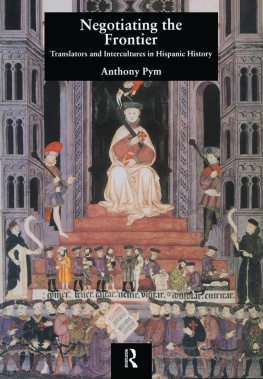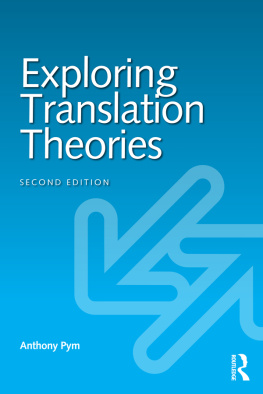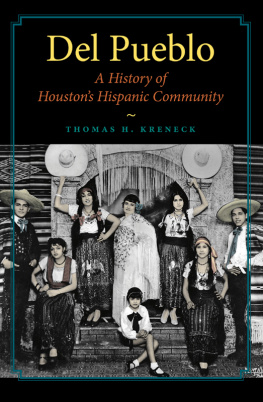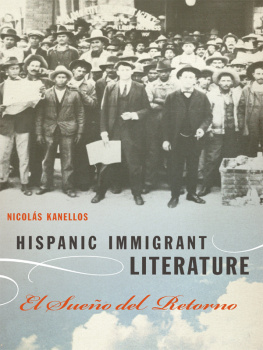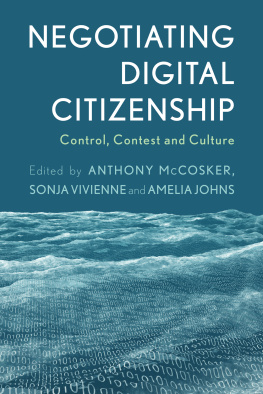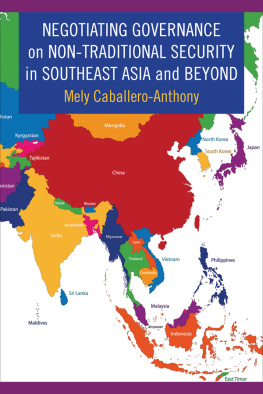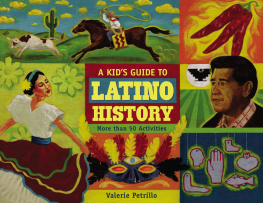Anthony Pym - Negotiating the Frontier : Translators and Intercultures in Hispanic History
Here you can read online Anthony Pym - Negotiating the Frontier : Translators and Intercultures in Hispanic History full text of the book (entire story) in english for free. Download pdf and epub, get meaning, cover and reviews about this ebook. year: 2000, publisher: Routledge, genre: Religion. Description of the work, (preface) as well as reviews are available. Best literature library LitArk.com created for fans of good reading and offers a wide selection of genres:
Romance novel
Science fiction
Adventure
Detective
Science
History
Home and family
Prose
Art
Politics
Computer
Non-fiction
Religion
Business
Children
Humor
Choose a favorite category and find really read worthwhile books. Enjoy immersion in the world of imagination, feel the emotions of the characters or learn something new for yourself, make an fascinating discovery.
- Book:Negotiating the Frontier : Translators and Intercultures in Hispanic History
- Author:
- Publisher:Routledge
- Genre:
- Year:2000
- Rating:5 / 5
- Favourites:Add to favourites
- Your mark:
- 100
- 1
- 2
- 3
- 4
- 5
Negotiating the Frontier : Translators and Intercultures in Hispanic History: summary, description and annotation
We offer to read an annotation, description, summary or preface (depends on what the author of the book "Negotiating the Frontier : Translators and Intercultures in Hispanic History" wrote himself). If you haven't found the necessary information about the book — write in the comments, we will try to find it.
Anthony Pym: author's other books
Who wrote Negotiating the Frontier : Translators and Intercultures in Hispanic History? Find out the surname, the name of the author of the book and a list of all author's works by series.
Negotiating the Frontier : Translators and Intercultures in Hispanic History — read online for free the complete book (whole text) full work
Below is the text of the book, divided by pages. System saving the place of the last page read, allows you to conveniently read the book "Negotiating the Frontier : Translators and Intercultures in Hispanic History" online for free, without having to search again every time where you left off. Put a bookmark, and you can go to the page where you finished reading at any time.
Font size:
Interval:
Bookmark:

Negotiating the Frontier Translators and Intercultures in Hispanic History
Anthony Pym

First published 2000 by St. Jerome
Publishing Published 2014 by Routledge
2 Park Square, Milton Park, Abingdon, Oxon OX14 4RN
711 Third Avenue, New York, NY 10017, USA
Routledge is an imprint of the Taylor & Francis Group, an informa business
Anthony Pym 2000
All rights reserved. No part of this book may be reprinted or reproduced or utilised in any form or by any electronic, mechanical, or other means, now known or hereafter invented, including photocopying and recording, or in any information storage or retrieval system, without permission in writing from the publishers.
Notices
Knowledge and best practice in this field are constantly changing. As new research and experience broaden our understanding, changes in research methods, professional practices, or medical treatment may become necessary.
Practitioners and researchers must always rely on their own experience and knowledge in evaluating and using any information, methods, compounds, or experiments described herein. In using such information or methods they should be mindful of their own safety and the safety of others, including parties for whom they have a professional responsibility.
To the fullest extent of the law, neither the Publisher nor the authors, contributors, or editors, assume any liability for any injury and/or damage to persons or property as a matter of products liability, negligence or otherwise, or from any use or operation of any methods, products, instructions, or ideas contained in the material herein.
ISBN 13: 978-1-900650-25-0 (pbk)
Cover design by Steve Fieldhouse, Oldham, UK
Typesetting by Delta Typesetters
British Library Cataloguing in Publication Data
A catalogue record of this book is available from the British Library
Library of Congress Cataloging in Publication Data
A catalogue record of this book is available from the Library of Congress
for Juliette and John,
may they find homes where they will
Contents & Arguments
Introduction
Translators, Intercultures, and Hispanic Frontier Society
If we want to know how cultures interrelate, it is worth looking closely at who the intermediaries are and how they work in intercultures (overlaps of cultures, defined by criteria of professionalism and secondness). The frontier society of the Hispanic reconquista contained certain kinds of intercultural groups, the development of which can be traced through later history. The work of such groups can be analyzed in terms of the ways cultural frontiers are agreed upon, and the modes of agreement can be approached through neo-classical negotiation theory and the general concept of regimes.
In 1142 the abbot of Cluny visited Hispania and sponsored a Latin translation of the Quran. This set the scene for later translation activities in Toledo. Formulated on the frontier between Christian and Islamic Europe, the translation project was justified in terms of providing information for a future disputation that would save souls from the heresy of Islam. However, in calling for open debate on the basis of translation, the abbot risked exposing the sacred texts of Christianity to the same examination. In effect this meant siding with the main intercultural writers working on the project, who were more interested in science than religion. The actual translator of the Quran thus did a shoddy job, for which he was happy enough to take the abbots gold. The culture of generalized disputation, which would eventually undo the authority of the church, was then used to remarkably little avail against Islam.
Despite all the talk about a twelfth-century School of Translators in Toledo, the scientific translating that took place there remains a poorly understood phenomenon. Attention to its political dimension suggests that it should not be attached to the state-subsidized work carried out under Alfonso X after 1250 but is better explained in terms of Cluniac sponsorship of the first Latin translation of the Quran in 1142. This approach reveals grounds for potential conflict between the foreign scientific translators and the Toledo cathedral. Such conflict would nevertheless have been smoothed over by certain translation principles serving both scientific and religious interests. The foremost of these principles were literalism, secondary elaboration, the use of teamwork, the inferiorization of non-Latinist intermediaries, the justification of conquest, and the accordance of authority to non-Christian texts. Thanks to this shared regime, the church helped scientific translations to enter Latin.
The mainly protoscientific translations carried out after 1250 for Alfonso X of Castile are among the reasons why the king has been dubbed the Learned. The translations were from Arabic into Castilian, although further translations were made from Castilian into Latin and French. Some historians have wil-fully attached these court-organized activities to the properly twelfth-century translations carried out into Latin for the Toledo cathedral, as if there had been a merely logical transition from church to court. It can be argued, however, that the Alphonsine translations resulted from a nation-building language policy that opposed church power by avoiding the use of Latin for translations from Arabic. Coupled to this was a specific extranslation policy designed to win the king international prestige by translating from Castilian target texts and using Latin when required. These two aspects of the general policy corresponded to two teams of professional intercultural mediators, comprising mainly Jews for the work into Castilian and Italians for translations from Castilian. The policy, and its economic results, can be compared with similarly nationalist language policies operative in Europe today.
Since the introduction of paper-making coincided with the translation teams of both ninth-century Baghdad and thirteenth-century Castile, one might legitimately speculate on the consequences this material technology might have had for medieval translation processes. Attention to the translations commissioned by Alfonso X from 1250 suggests that the use of paper would have allowed intermediary versions to be written out in full and corrected, thus promoting increased bureaucratization and state control of translation activities. Comparison with print culture also suggests that the initial use of paper extended rather than opposed oral-based translation processes, challenging the ideal of the definitive target text in much the same way as computer-based networking is doing today.
In the early fifteenth century the Grand Master of the Order of Calatrava commissioned rabbi Mose Arragel to translate the Old Testament into Castilian and to provide numerous rabbinical glosses, to which Christian glosses were added. The result, known as the Biblia de Alba, is an apparently hybrid document based on a complex negotiation of cultural and religious boundaries. From the rabbis explicit documentation of the negotiation and drafting processes, it is possible to formalize the principles used for the writing of the glosses and, on the basis of selected passages, for the actual translation itself, where key terms are invested with double meanings. The result is a frontier where a profoundly Rabbinic bible was effectively concealed beneath a Christianized surface.
In the course of the fifteenth century the Spanish names for translation changed from the morphology of
Next pageFont size:
Interval:
Bookmark:
Similar books «Negotiating the Frontier : Translators and Intercultures in Hispanic History»
Look at similar books to Negotiating the Frontier : Translators and Intercultures in Hispanic History. We have selected literature similar in name and meaning in the hope of providing readers with more options to find new, interesting, not yet read works.
Discussion, reviews of the book Negotiating the Frontier : Translators and Intercultures in Hispanic History and just readers' own opinions. Leave your comments, write what you think about the work, its meaning or the main characters. Specify what exactly you liked and what you didn't like, and why you think so.

